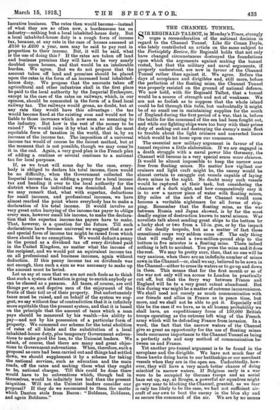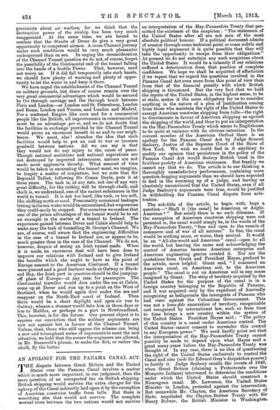THE CHANNEL TUNNEL.
SIR REGINALD TALBOT, in Monday's Times, strongly urges a reconsideration of the national decision in regard to the Channel Tunnel. Like Sir Conan Doyle, who lately contributed an article on the same subject to the Fortnightly Review, Sir Reginald holds that not only have changed circumstances destroyed the foundations upon which the arguments against making the tunnel rested, but that the military and naval arguments, if properly understood, are now in favour of the Channel Tunnel rather than against it. We agree. Before the days of aeroplanes and dirigibles and, still more, before the perfection of the floating mine, the Channel Tunnel was properly resisted on the ground of national defence. We now hold, with Sir Reginald Talbot, that a tunnel would be a source of strength and not of weakness. We are not so foolish as to suppose that the whole island could be fed through this tube, but undoubtedly it might be of no small use in maintaining supplies for the south of England during the first period of a war, that is, before the battle for the command of the sea had been fought out, and while our fighting ships were too busy with their prime duty of seeking out and destroying the enemy's main fleet to trouble about the light cruisers and converted liners which would be let loose upon our commerce.
The essential new military argument in favour of the tunnel requires a little elaboration. If we are engaged in a death struggle with a naval power like Germany, the Channel will become in a very special sense mare clausum. It would be almost impossible to keep the narrow seas free from floating mines. No matter how vigilant our cruisers and light craft might be, the enemy would be almost certain to smuggle out vessels capable of laying down mines in the night. No doubt many such vessels would be captured at their task, but considering the chances of a dark night, and how comparatively easy it is to sow a narrow piece of water with floating mines, fifty miles of the neck of the Channel would soon become a veritable nightmare for all forms of ship- ping. Remember that the floating mine, as the war between Russia and Japan showed, is by far the most deadly engine of destruction known to naval science. War novelists talk about sending great ships to the bottom by a lucky shot or two from a 12-in. gun, or by the impact of the deadly torpedo, but as a matter of fact these sensational coups very seldom come off. The only thing that will really send a two-million-pound ship to the bottom in five minutes is a floating mine. There indeed nothing is left to accident. You press the mine and it does the rest. We may be pretty sure, then, that no one will be very anxious, when there are an indefinite number of mines sown in the Channel—or, shall we say, believed to be sown in the Channel—either to cross its waters or to go up and down in them. This means that for the first month or so of the war not only will sea access to London be practically cut off, but that the ferry way between France and England will be to a very great extent abandoned. But this during war might be a matter of extreme inconvenience. We shall need not merely as much communication with our friends and allies in France as in peace time, but more, and we shall not be able to get it. Especially will this be the case if we have, as in all human probability we shall have, an expeditionary force of 150,000 British troops operating as the extreme left wing of the French army which will be defending France from invasion. In a word, the fact that the narrow waters of the Channel give so great an opportunity for the use of floating mines lends enormous importance to the Channel Tunnel as being a perfectly safe and easy method of communication be- tween us and France.
Yet another pro-tunnel argument is to be found in the aeroplane and the dirigible. We have not much fear of these hawks doing harm to our battleships or our merchant vessels when they are in the open sea. Undoubtedly, how- ever, they will have a very much better chance of doing mischief in narrow waters. If Belgium early in a war were to be occupied by German troops and an aerial base set up, say, at Bruges, a powerful air squadron might go very near to blocking the Channel, granted, as we fear is only too likely to be the case, we had not sufficient air- craft of our own to beat the enemy in the blue sky and so secure the command of the air. We are by no means pessimists about air warfare, for we think that the destructive power of the airship has been very much exaggerated. At the same time, we are bound to confess that the Straits of Dover do give a very great opportunity to competent airmen. A cross-Channel journey under such conditions would be very much pleasanter underground than on sea. In urging the reconsideration of the Channel Tunnel question we do not, of course, forget the possibility of the Continental end of the tunnel falling into the hands of a hostile Power. That, however, need not worry us. If it did fall temporarily into such hands, we should have plenty of warning and plenty of oppor- tunity to let the water in and keep it there.
We have urged the establishment of the Channel Tunnel on military grounds, but there of course remain over the very great commercial advantages which would be secured by the through carriage and the through truck between Paris and.London—or London and St. Petersburg, London and Rome, London and Vienna, and London and Madrid. For a scattered Empire like ours and for a commercial people like the British, all improvements in communication must be an advantage per se, and we do not doubt that the facilities in exchange provided by the Chancel Tunnel would prove an enormous benefit to us and to our neigh- bours. We must, alas ! abandon the idea that such facilities would help to put an end to war or increase goodwill between nations. All we can say is that they would not do any injury to the cause of peace. Though national ambitions and national aspirations are not destroyed by improved intercourse, nations are not made more aggressive thereby. What amount of time would be taken in excavating the tunnel must, we imagine, he largely a matter of conjecture, but we note that Sir Reginald Talbot, following Sir Conan Doyle, puts it at three years. The task is, at any rate, not one of any very great difficulty, for the cutting will be through chalk, and chalk is, we understand, one of the easiest substances in the world to tunnel. It is not too hard, like rock, or too soft, like shifting earth or sand. Presumably occasional leakages letting in the sea-water would be encountered, but we presume they could easily be stopped. For ourselves we confess that one of the prime advantages of the tunnel would be to set an example in the matter of a tunnel to Ireland. The experience gained between Dover and Calais should help to make easy the task of tunnelling St. George's Channel. We are, of course, well aware that the engineering difficulties in the case of a tunnel to Ireland are, or appear to be, much greater than in the case of the Channel. We do not, however, despair of seeing an Irish tunnel made. When it is made, an enormous deal will have been done to improve our relations with Ireland and to give Ireland the benefits which she ought to have as the point of Europe nearest to the American Continent. If a tunnel were pierced and a. good harbour made at Galway or Black- sod Bay, the Irish port in question should be the jumping- off place of Europe—at any rate, for passengers. The Continental traveller would dive under the sea at Calais, come up at Dover and run up to a point on the West of Scotland, when he would again dive under the sea and reappear on the North-East coast of Ireland. Then there would be a short daylight and open-air run to Galway, whence a steamer would take him in three days or less to Halifax, or perhaps to a port in Newfoundland. This, however, is for the future. Our present object is to express our conviction that the military arguments are now not against but in favour of the Channel Tunnel. Unless, then, those who still oppose the scheme can bring a new and triumphant series of arguments to meet the new situation, we hold that the sooner the engineers are allowed, in Mr. Roosevelt's phrase, to make the dirt, or rather the chalk, fly the better.















































 Previous page
Previous page